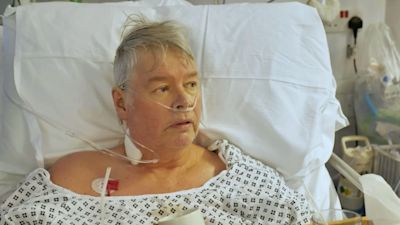How crowded NHS hospitals in England are keeping patients in need of operations out

For her series Fight on the Frontline ITV News Health Editor Emily Morgan and her team are visiting three different hospitals over three days to focus on the three major issues facing the NHS: staffing shortages, bed capacity and demand.
With the health service declaring itself on a "war footing" as it battles with winter pressures and rising Covid cases amid the Omicron wave, Emily Morgan will speak to those who are fighting on the frontline to find out what it all means for them and those for which they care.
The changes to the Covid isolation period in England should help ease the pressure on NHS hospitals suffering because of a lack of staff.
And new figures showed that doctors and nurses are needed more than ever to reduce a spiralling backlog.
There is now a record number of people on a hospital waiting list in England - the figure hit almost six million for the first time in November.
Waits in Accident and Emergency also reached a new record, with nearly 13,000 patients waiting more than 12 hours.
For the second report in her Fight on the Frontline series, ITV News Health Editor Emily Morgan was at the Royal Bournemouth hospital on Thursday, where the problem is particularly acute.
ITV News Health Editor Emily Morgan has been visiting the country's hospitals, meeting the staff under strain
For every Covid patient that ends up there, many other people who need planned operations then can’t have a bed here. And demand in A&E is even greater.
Bruce Hopkins, Emergency Department Matron, said slower ambulance times are having a knock-on impact.
“A lot of patients are kind of voting with their feet because there is such long waits for ambulances, so they are walking in with illnesses that they would have otherwise presented via ambulance,” he said.
“We just kind of have a bit of a medical ‘Where’s Wally?’ where we try to find the sickest patient in a crowded waiting room.
“Because those chest pains and abdominal pains are also being mixed with patients who should have really gone to the GP."
Listen to our coronavirus podcast:
In Bournemouth, there are seven wards’ worth of people in hospital who shouldn’t be there.
This amounts to 200 people who are fit to leave the hospital but have nowhere to go because care homes are shut.
Tristan Richardson, medical director, said freeing that kind of space would make a big difference.
“Automatically, if we have empty beds in our wards that means we can empty our emergency departments,” he said.
“Which means we don’t have any queueing ambulances, which means those ambulances can go to give care at home.”